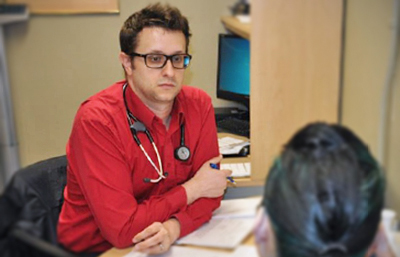Culture is key when teaching diabetes self-management
Staff at Richmond Hospital’s Diabetes Education Centre realized they needed to rethink the healthy eating and nutrition program offered through the centre when they kept getting the same feedback from their diabetes patients: “I don’t eat half of the foods you just talked about.”
The honest response made sense, given most of the program’s participants are of Chinese ethnicity and reflective of Richmond’s ethnic make-up.
Sparked by this feedback – and by the fact that people of Asian, Aboriginal, South Asian, Hispanic, and African descent are at greater risk of developing type 2 diabetes — Vancouver Coastal Health Research Institute clinician and clinical director of the Diabetes Education Centre, Dr. David Harris, along with the centre’s registered dietitian, Natalie Choy, and diabetes registered nurse Yvonne Kwong have developed a clinical study to test the efficacy and feasibility of offering Chinese-Canadian patients cooking classes in their own language.
“We want to address specific challenges that affect ethnic Chinese patients with diabetes in Canada and we’re starting to promote Chinese-Canadian health in the community of Richmond because we recognize the necessity,” said Dr. Harris, who is also an internal medicine, endocrinology, and metabolism specialist at Richmond Hospital.
Cooking class will inform research
The new cooking class will serve as a research project, and is tailored to include foods commonly used in the participants’ culture. The study team hopes to enrol 100 Chinese patients with diabetes in Richmond into the new cooking class. All participants will attend two four-hour education classes focused on the background of diabetes, medications for the disease, and dietary and lifestyle recommendations for diabetes patients.
“Our hope is that our patients will be able to bring these cooking skills and self-management learnings into their day-to-day lives to improve their health,” said Choy. “Hopefully they realize it’s not that difficult to cook a meal that helps manage their diabetes or to go for a short walk after eating.”
A chef-led experience
Chef Mickey Tse, the executive chef and manager of food service at SUCCESS Multi-Level Care Society, leads the classes along with Choy and Kwong, and highlights healthy Chinese foods and styles of cooking using selected recipes fromDiabetes Eating Wisdom: Chinese Recipes and Health Tips.
During the four hours, study participants will learn how to prepare their meals and will also learn more about diabetes self-management, such as food choices, meal planning and preparation, portion control, self-monitoring of blood glucose levels, and physical activity. Before eating the meal and two hours after eating, participants checked their blood sugar levels so they could actually see how the foods they ate impacted them and how the exercise affected them as well.
The first cooking class took place in early September.
Education and/or cooking classes
According to Dr. Harris, the research team will complete the cooking class intervention and then evaluate the patients’ glycemic control, blood work, self-care questionnaires and other simple parameters of diabetes care, two-to-three months after completing the cooking classes and compare them to those participants who only received the education classes.
“At the end of the day, diabetes patients of different ethnic backgrounds want more education about some of the things they already eat with their families on a day-to-day basis and how healthy (or unhealthy) those foods are,” Dr. Harris said. “Ours is a small study but we hope to show that tailoring an intervention such as this is a worthwhile effort – it hopefully gets people with diabetes to live healthier and it may also improve the health of our community.”


Betty Wills
I love to hear more about the design of the study. I am a doctoral prepared nurse and also speak Cantonese. This is a really worthwhile study but I would recommend to look at outcome measures for behavior changes in addition to providing knowledge. Looking forward to seeing the outcomes of the study. All the best to the team.
Regards,
Betty Wills (Chan), RN, PhD